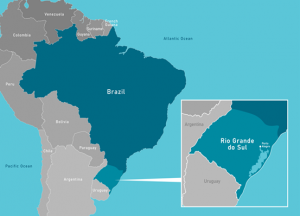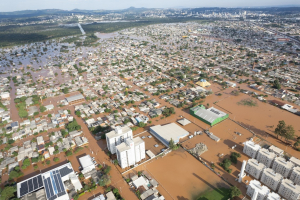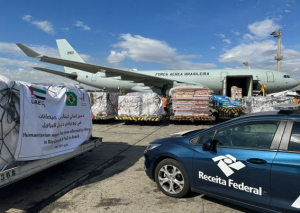How Brazilian Customs took action following the largest extreme climatic event in its history
23 June 2025
By Altemir Linhares de Melo, Superintendent of the Federal Revenue Service in Rio Grande do Sul, Gastão Figueira Tonding, Federal Revenue Service of Porto Alegre, and Marcelo Clark Alves, President of the Union of Customs Brokers of Rio Grande do SulSouthern Brazil was hit by the worst floods in more than 80 years in 2024, forcing hundreds of thousands of people to flee their homes. People from all over the world reacted to the news by sending donations. To rapidly process those shipments, the Brazilian Federal Revenue (Receita Federal – RFB) developed a fast-track procedure whose implementation benefited from the engagement of all actors involved in the importation process, especially brokers.
 Between the end of April and the beginning of May 2024, the State of Rio Grande do Sul in Brazil experienced the worst meteorological event in its history. Constant and intense rainfall resulted in a sharp rise in river levels and, on 1 May 2024, the State government declared a state of emergency throughout the entire State.
Between the end of April and the beginning of May 2024, the State of Rio Grande do Sul in Brazil experienced the worst meteorological event in its history. Constant and intense rainfall resulted in a sharp rise in river levels and, on 1 May 2024, the State government declared a state of emergency throughout the entire State.
In just three days, 96% of the State’s cities were affected, with rainfall totals exceeding 600 mm in some municipalities, and a large area of the State recording precipitation levels above 400 mm. Around 2.4 million people were affected. 581,638 individuals were displaced, 55,813 had to be sheltered, 77,712 had to be rescued, and 178 died.
All personnel and equipment from the Federal Revenue were mobilized to support the Civil Defence Agency in charge of coordinating the disaster response. Dozens of drones, helicopters, and trucks were allocated to rescue operations and to the distribution of supplies to emergency shelters.
The Federal Revenue also adopted a series of fiscal measures, provided seized goods to be distributed to the affected population, and implemented a fast-track procedure for the importation of donations, with the support of all actors involved in import operations, especially brokers.
Extending payment deadlines and speeding up the release of tax credits
Deadlines for all procedural and tax obligations were extended by up to 120 days to keep resources that, under normal circumstances would have been collected by the federal government, circulating in the affected economy.
Moreover, to help revive economic activity, the Federal Revenue also sought to speed up the analysis and release of tax credits to which taxpayers were entitled, totalling approximately USD 1.2 billion, along with the early release of nearly USD 500 million in tax credits, directly benefiting more than 900,000 taxpayers registered in the region.

Donating seized goods
Over 300,000 items which had been seized by the Customs Department but posed no harm to human health were given to the State’s Civil Defence Agency, which was responsible for maintaining the emergency structures created to assist those who were displaced. Items included clothing, food, hygiene products, mattresses and toys.
Simplifying the import of donations
Brazil Customs regulations have specific provisions for the import of donations, but these are not adapted to natural disasters. All importers, including governmental institutions, must have an import licence and submit Customs declarations via Brazil’s Foreign Trade Single Window, the “Portal Único Siscomex”. Moreover, the procedure requires them to obtain an import licence for certain categories of goods, certifying the nature or the quality of the goods. For example, the import of medicine needs the approval of the National Health Surveillance Agency (ANVISA).
- Resolution on the Role of Customs in Natural Disaster Relief
- Revised Kyoto Convention, Guidelines to Specific Annex J, Chapter 5
- Annex B.9 to the Istanbul Convention
- Model Agreement to expedite the import of relief consignments and possessions of relief personnel in the event of disasters and emergencies
- WCO Guidelines on disaster management and supply chain continuity
- And much more
The disaster sparked an immense sense of solidarity, and a large number of goods declared as donations on the bill of lading kept on arriving for weeks at dozens of Customs offices spread across Brazil’s large territory.
The government did not publish a list of essential goods or equipment to be exempted from taxes and duties at import. Instead, any shipment was considered a duty- and tax-exempt donation if its bill of lading indicated that the Ministry of Foreign Affairs or the “Military House”[1] of the State of Rio Grande do Sul was the consignee (i.e. the cargo’s legal owner upon its arrival, who would claim the cargo and fulfil all related obligations, such as paying applicable import duties and taxes).
A simplified import procedure named “Revenue – Fast Track” was implemented to process those shipments. Importers were required to fill in a simplified paper Customs declaration containing data on the goods (description, weight, quantity, value, origin and destination) and on the transporting vehicle.

The agencies enforcing regulations applying to imported goods supported the new procedure. ANVISA, in charge of the clearance of medicines and food; MAPA (Ministry of Agriculture, Livestock, and Supply), in charge of the analysis of agricultural imports; and INMETRO (National Institute of Metrology, Quality, and Technology), in charge of the certification and quality exams of some products, issued licences and conducted controls quickly.
Last but not least, the Federal Revenue reached out to the Union of Customs Brokers of Rio Grande do Sul to ask for their members to volunteer to manage the clearance of donations on behalf of the Civil Defence Agency and the Ministry of Foreign Affairs. The brokers had to monitor the arrival of goods, and prepare and submit the simplified Customs declarations. Depending on the nature of the goods, they also had to ask the relevant regulatory agencies to issue importation licences. The Customs brokers also assisted the Customs Department in developing a guide with instructions on how to handle the simplified procedure. This document, which also included the contact information of the brokers supporting the process, was sent to all Customs Offices across the country.
Groups were created in email and instant messaging applications in order to ensure swift communication between Federal Revenue officers, Civil Defense Agency representatives, Ministry of Foreign Affairs officials, and Customs brokers. This enabled all parties involved in the importation process at a specific port of entry to coordinate actions, exchange information and ensure that the goods were handed over to authorized carriers in the shortest time possible. Support was also provided by carriers, as well as warehouse, cargo terminal, port and airport operators, who all eased their administrative requirements and even waived their fees.
The contribution of Customs brokers was duly recognized by the Federal Revenue on International Customs Day on 26 January 2025, when the Federal Revenue Secretary, Carlos Alberto Freitas Barreto, handed over a WCO Merit Certificate to Marcelo Clark Alves, the President of the Union of Customs Brokers of Rio Grande do Sul.
Way ahead
Brazilian authorities are now focusing on developing a protocol to address the management of personal donations, relief and humanitarian aid following a catastrophe or a disaster. WCO instruments (see box below) will be used to draft the protocol, which will be incorporated into Customs legislation and made available to other Customs administrations via the WCO.
More information
Contact the RFB
[1] The Casa Militar is an institution in Brazil designed to ensure the personal security and the transportation of the Governor, the Vice-Governor and their families, as well as the physical security and management of several governmental buildings.

